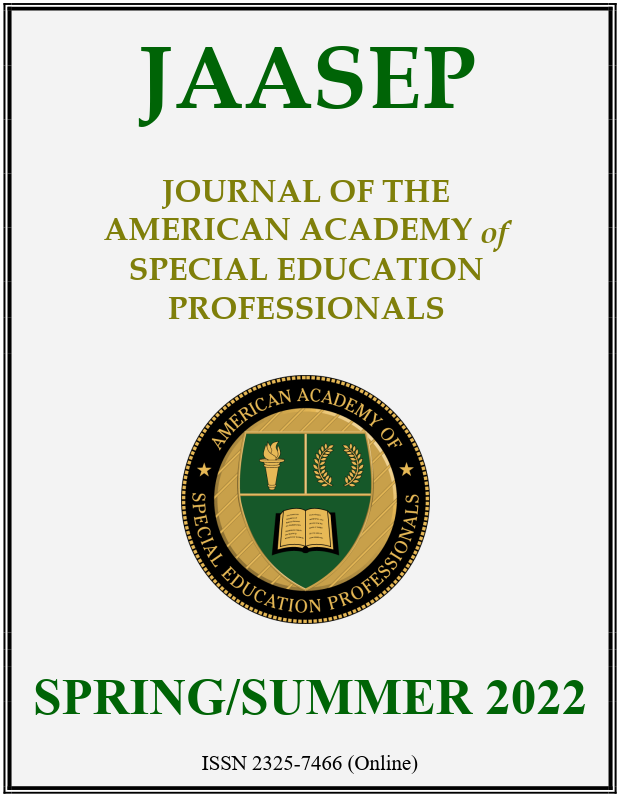Increasing Pre-service Special Education Teacher Skills on Performance Feedback
Billingsley, B. (2007). Recognizing and supporting the critical roles of teachers in special education leadership, Exceptionality, 15(3), 163-176. https://doi.org/10.1080/09362830701503503 DOI: https://doi.org/10.1080/09362830701503503
Buell, M. J., Hallam, R., Gamel-McCormick, M., & Scheer, S. (1999). A survey of general and special education teachers' perceptions and in-service needs concerning inclusion. International Journal of Disability, Development and Education, 46(2), 143-156. https://doi.org/10.1080/103491299100597 DOI: https://doi.org/10.1080/103491299100597
Carter, E. W., Asmus, J., Moss, C. K., Biggs, E. E., Bolt, D. M., Born, T. L., Brock, M. E., Cattey, G. N., Chen, R., Cooney, M., Fesperman, E., Hochman, J. M., Huber, H. B., Lequia, J. L., Lyons, G., Moyseenko, K. A., Reisch, L. M., Shalev, R. A., Vincent, L. B., & Weir, K. (2016). Randomized evaluation of peer support arrangements to support the inclusion of high school students with severe disabilities. Exceptional Children, 82(2), 209-233. https://doi.org/10.1177/0014402915598780 DOI: https://doi.org/10.1177/0014402915598780
Collins, B. C., Branson, T. A., Hall, M., & Rankin, S. W. (2001). Teaching secondary students with moderate disabilities in an inclusive academic classroom setting. Journal of Developmental and Physical Disabilities, 13(1), 41-59. https://doi.org/10.1023/A:1026557316417 DOI: https://doi.org/10.1023/A:1026557316417
Council for Exceptional Children. (2015). What Every Special Educator Must Know: Professional Ethics and Standards. https://www.cec.sped.org/~/media/Files/Standards/Professional%20Preparation%20Standards/Initial%20Preparation%20Standards%20with%20Explanation.pdf
Da Fonte, M. A., & Barton-Atwood, S. M. (2017). Collaboration of general and special education teachers: Perspectives and strategies. Intervention in School and Clinic, 53(2), 99-106 https://doi.org/10.1177/1053451217693370 DOI: https://doi.org/10.1177/1053451217693370
DeMatthews, D. E., Kotok, S., & Serafini, A. (2019). Leadership preparation for special education and inclusive schools: Beliefs and recommendations from successful principals. Journal of Research on Leadership Education, 0(0), 1-27. https://doi.org/10.1177/1942775119838308 DOI: https://doi.org/10.1177/1942775119838308
Fuchs, W. W. (2009-2010). Examining teachers' perceived barriers associated with inclusion. Southeastern Regional Association of Teacher Educators Journal, 19(1), 30-35. https://files.eric.ed.gov/fulltext/EJ948685.pdf
Hidayati, L., & Pardjone, P. (2018). The implementation of role play in education of pre-service vocational teacher. IOP Conference Series: Materials Science and Engineering, 296. https://doi.org/10.1088/1757-899X/296/1/012016 DOI: https://doi.org/10.1088/1757-899X/296/1/012016
Hudson, M. E. (in press). Is practice in a mixed-reality environment better than role play for promoting implementation fidelity of the constant time delay procedure for special education undergraduates? Journal of the American Academy of Special Education Professionals
Hudson, M. E., & Browder, D. M. (2014). Improving listening comprehension responses for students with moderate intellectual disability during literacy class. Research and Practice for Persons with Severe Disabilities, 39, 11-29. doi:10.1177/1540796914534634 DOI: https://doi.org/10.1177/1540796914534634
Hudson, M. E., Browder, D. M., & Jimenez, B. A. (2014). Effects of a peer-delivered system of least prompts intervention with adapted science read-alouds on listening comprehension for students with moderate intellectual disability. Education and Training in Autism and Developmental Disabilities, 49, 60-77
Hudson, M. E., Voytecki, K., Owens, T. L., & Zhang, G. (2019). Preservice teacher experiences implementing classroom management practices through mixed reality simulations. Rural Special Education Quarterly, 38, 79-94. DOI: https://doi.org/10.1177/8756870519841421
Hudson, M. E., Voytecki, K. S., & Zhang, G. (2018). Mixed-reality teaching experiences improve preservice special education students’ perceptions of their ability to manage a classroom. Journal of Virtual Worlds Research, 11(2), 1-17. DOI: https://doi.org/10.4101/jvwr.v11i2.7308
Individuals with Disabilities Education Improvement Act of 2004, P.L. 108-446, 20 U.S.C. $ 1400 et seq.
Leko, M. M., Brownell, M. T., Sindelar, P. T., & Kiely, M. T. (2015). Envisioning the future of special education personnel preparation in a standards-based era. Exceptional Children, 82(1), 25–43. https://doi.org/10.1177/0014402915598782 DOI: https://doi.org/10.1177/0014402915598782
Mangin, M. M., & Stoelinga, S. R. (2008). Teacher leadership: What it is and why it matters. In M. M. Mangin & S. R. Stoelinga (Eds.), Effective teacher leadership: Using research to inform and reform (pp. 1–9). Teachers College Press.
McHatton, P. A., & Parker, A. (2013). Purposeful preparation: Longitudinally exploring inclusion attitudes of general and special education pre-service teachers. Teacher Education and Special Education, 36(3), 186-203. https://doi.org/10.1177/0888406413491611 DOI: https://doi.org/10.1177/0888406413491611
Obiakor, F. E., Harris, M., Mutua, K., Rotatori, A., & Algozzine, B. (2012). Making inclusion work in general education classrooms. Education and Treatment of Children, 35(3), 477-490. DOI: https://doi.org/10.1353/etc.2012.0020
Rao, D., & Stupans, I. (2012). Exploring the potential of role play in higher education: Development of a typology and teacher guidelines. Innovations in Education and Teaching International, 49, 427-436. https://doi.org/10.1080/14703297.2012.728879 DOI: https://doi.org/10.1080/14703297.2012.728879
Santoli, S. P., Sachs, J., Romey, E. A., & McClurg, S. (2008) A successful formula for middle school inclusion: Collaboration, time, and administrative support. Research in Middle Level Education Online, 32(2), 1-13. https://doi.org/10.1080/19404476.2008.11462055 DOI: https://doi.org/10.1080/19404476.2008.11462055
Silva, D. Y., Gimbert, B., & Nolan, J. (2000). Sliding the doors: Locking and unlocking possibilities for teacher leadership. Teachers College Record, 102(4), 779–804. Sweigart, C. A., Collins, L. W., Evanovich, L. L., & Cook, S. C. (2016). An evaluation of the evidence base for performance feedback to improve teacher praise using CEC’s quality indicators. Education & Treatment of Children, 39(4), 419-444. https://doi.org/10.1353/etc.2016.0019 DOI: https://doi.org/10.1353/etc.2016.0019
Turnbull III, H. R., Turnbull, A. P., Wehmeyer, M. L., & Park, J. (2003). A quality of life framework for special education outcomes. Remedial and Special Education, 24(2), 67-74. https://doi.org/10.1177/07419325030240020201 DOI: https://doi.org/10.1177/07419325030240020201
Wasley, P. A. (1991). Teachers who lead: The rhetoric of reform and realities of practice. Teachers College Press.
Wenner, J. A., & Campbell, T. (2017). The theoretical and empirical basis of teacher leadership: A review of the literature. Review of Educational Research, 87(1), 134-171. https://doi.org/10.3102/0034654316653478 DOI: https://doi.org/10.3102/0034654316653478
Downloads
Article Information
- Article Type Articles
- Submitted May 12, 2022
- Published June 15, 2022
- Issue Spring/Summer 2022
- Section Articles
